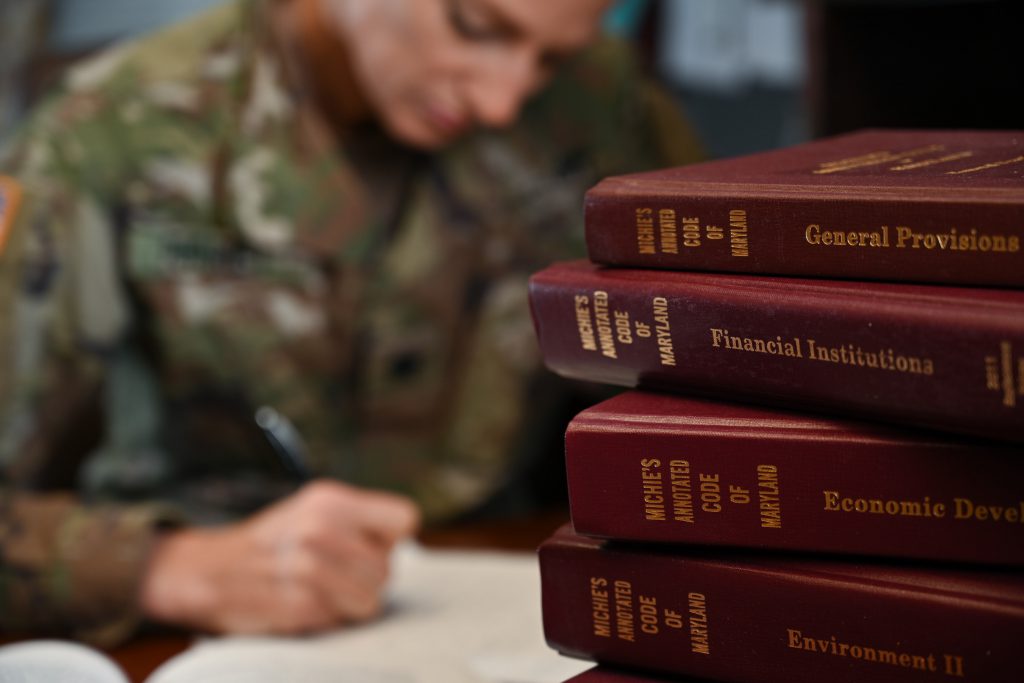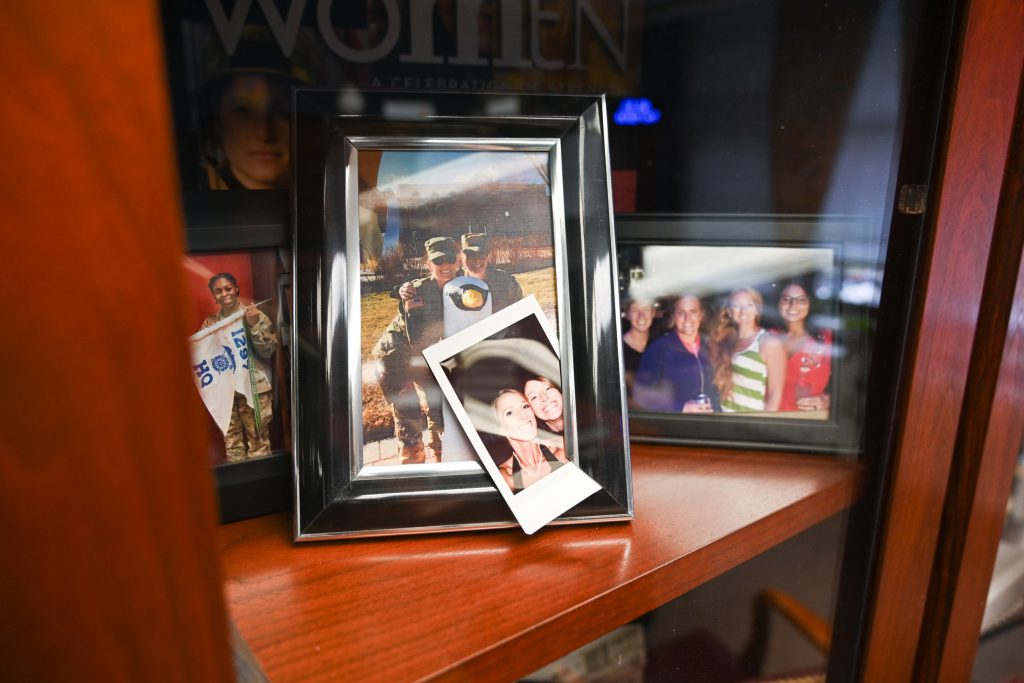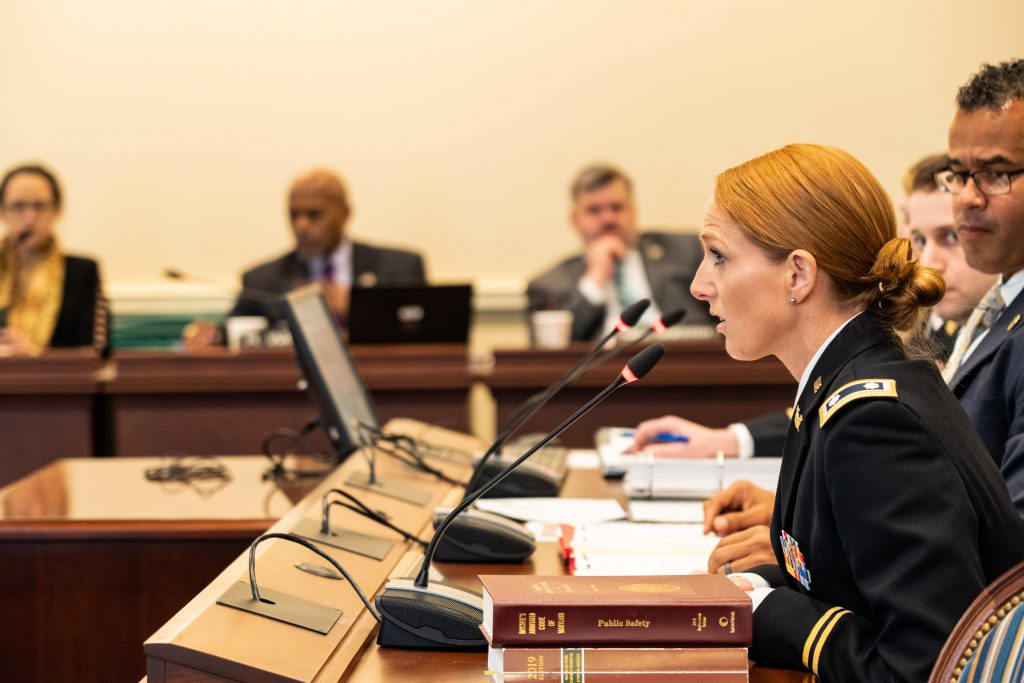First Female Staff Judge Advocate in MDNG
[vc_row][vc_column][vc_single_image image=”3706″ img_size=”full”][vc_column_text]By Senior Airman Sarah M. McClanahan, Maryland National Guard Public Affairs Office[/vc_column_text][vc_column_text]U.S. Army Lt. Col. Rose Forrest is someone who has found herself in many impactful roles throughout her life. She served as a paralegal when she first enlisted in the military to becoming a battalion commander then moving on to share her legal expertise to the Maryland National Guard’s Judge Advocate General’s Corps. Forrest rose to become the Maryland National Guard’s first female staff judge advocate.
SJAs are essential legal experts who use the law to help Maryland Military Department members solve problems, to provide advice to commanders on legal matters, and advise on court-martial cases.
While SJAs serve in both National Guard and active duty capacities, Forrest explains there are some distinct differences between the two roles.
“In general, [National Guard SJAs] advise the adjutant general, an officer who wears both a state and federal hat,” explains Forrest. “In Maryland’s case, the adjutant general is a member of the governor’s cabinet and is the head of the state military department.”

So a National Guard SJA must be knowledgeable in not only the Uniform Code of Military Justice and federal law, but also their state law. Forrest explains this isn’t something specifically taught in their training, since the laws among the states differ, which can lead to a bumpy on-the-job learning curve.
“I was always interested in law,” said Forrest. “I liked the idea of solving problems with language and advocacy. I like knowledge. You can change people’s minds with information.”
Initially, Forrest pursued journalism as an undergraduate major as her avenue to making an impact on the world through telling people’s stories. Shortly after earning her bachelor’s degree, she ended up teaching preschool for a Head Start program where she stumbled across her passion for advocacy.
“It was physically, emotionally, and intellectually draining and I felt for these children,” explains Forrest. “I felt like they needed advocates and so I went to law school with the initial plan of being a child advocate.”
While this specific civilian career choice didn’t fully come to fruition, she did attain her goal of becoming a lawyer.
Forrest explains even at the start of her military career she had the big picture of becoming a lawyer. At 19 years old, she didn’t quite know what that would look like and what she would eventually accomplish.
As she progressed through various positions throughout her military career, she realized her passion for leading when she became a commander for the Headquarters and Headquarters Company, 1297th Combat Support Sustainment Battalion.

“One of the best jobs I ever had was commanding that unit,” expressed Forrest. “I got it in my mind that I wanted to pursue command roles for the rest of my career. But I had some mentors in my life who recognized [the skills I had] as a civilian lawyer.”
One such mentor, Army Brig. Gen. Adam Flasch, who was then a lieutenant colonel, identified a skillset that the MDNG needed and encouraged her to join the MDNG JAG at a time when there were a limited number of attorneys across the Maryland Military Department.
However, moving on from her command role wasn’t easy for Forrest.
“Although I’m very happy to be here [in the JAG Corps], I didn’t always know this was my path,” Forrest explains. “I really enjoyed my time as a [commander]. I was worried when I became a JAG I’d give up that opportunity to influence the mission.”
However, she received some insightful advice from Flasch that aided in her decision.
Flasch explained to Forrest she was not giving up her role as a leader. She was simply changing it. Instead of acting as a [commander], she would be advising them. The advice she will give is critical and will still influence the mission.
“Good leadership is about creating an organization that operates consistently for every civilian, Soldier, and Airman,” said U.S. Army Brig. Gen. Adam R. Flasch, director, Joint Staff, Maryland National Guard. “It is about transparency of process and outcome, which is where the SJA plays a critical role. They [SJAs] help leaders see pitfalls in their own decision making, and serve as a sounding board to ensure our decisions are just and fair.”
With this advice, Forrest was able to re-evaluate her career path and how she could lead in different ways.
“What I have learned, is that the JAG’s role to advise the commander is a critical part of enforcing Army standards. Loyalty, duty, respect, selfless service, honor, integrity, and personal courage develop when Soldiers trust that rules and regulations apply to everyone equally.”
A critical way Forrest is impacting the mission is continuing to build a diverse legal team within the Maryland National Guard.
“For the past several years, we’ve really been building up our legal capabilities in the state,” says Forrest. “We have a lot of new judge advocates and paralegals in both the Army and the Air [National Guard]. Leadership understands it’s important to fill those billets and to staff those positions.”
Forrest was the sole female member of the JAG Corp when she joined. So when building up their office, she was deliberate to keep diversity in mind. This not only involved diversity of gender and ethnicity, but diversity of thought.
“I think if somebody walks in for an interview and their legal philosophy is completely different from mine, I’m probably going to hire them,” explains Forrest. “When somebody presents them with a problem, [they are able] to analyze the problem and look at it from different perspectives.”

These varying points of view are exactly the attributes Forrest is aiming to build her legal team with. She was even able to develop her own diverse experiences after following some atypical advice upon entering the military.
“My father told me when he was drafted in Vietnam and he was going through basic training, he raised his hand and volunteered [to be] a chaplain’s assistant,” Forrest describes. “So they sent him to Vietnam and they gave him a jeep and an M-16 and said ‘go drive around the jungle.’ So when I enlisted in the Army, he said ‘whatever you do, volunteer for everything.’ Which is not the usual advice. They usually say ‘keep your head down, keep your hand down.’ So I’ve tried to do that [the former] and it’s worked out well.”
However, with so many paths to take, Forrest emphasizes the value of having confidence in your decisions.
“I think it’s important to have faith in yourself and your choices,” says Forrest. “You can have analysis paralysis where you spend so much time trying to figure out what’s perfect that you end up missing out on what’s possible. You just have to jump in, volunteer and raise your hand to see where life takes you.”
 [/vc_column_text][/vc_column][/vc_row]
[/vc_column_text][/vc_column][/vc_row]
